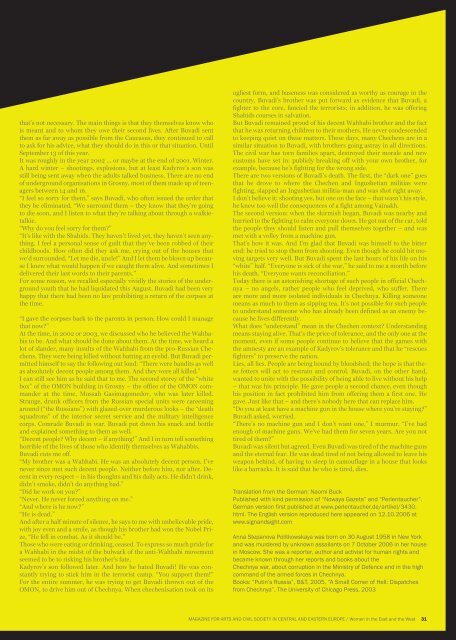You also want an ePaper? Increase the reach of your titles
YUMPU automatically turns print PDFs into web optimized ePapers that Google loves.
that’s not necessary. The main things is that they themselves know who<br />
is meant and to whom they owe their second lives. After Buvadi sent<br />
them as far away as possible from the Caucasus, they continued to call<br />
to ask for his advice, what they should do in this or that situation. Until<br />
September 13 of this year.<br />
It was roughly in the year 2002 ... or maybe at the end of 2001. Winter.<br />
A hard winter – shootings, explosions, but at least Kadyrov’s son was<br />
still being sent away when the adults talked business. There are no end<br />
of underground organisations in Grosny, most of them made up of teenagers<br />
between 14 and 16.<br />
“I feel so sorry for them,” says Buvadi, who often issued the order that<br />
they be eliminated. “We surround them – they know that they’re going<br />
to die soon, and I listen to what they’re talking about through a walkietalkie.<br />
“Why do you feel sorry for them?”<br />
“It’s like with the Shahids. They haven’t lived yet, they haven’t seen anything.<br />
I feel a personal sense of guilt that they’ve been robbed of their<br />
childhoods. How often did they ask me, crying out of the houses that<br />
we’d surrounded, “Let me die, uncle!” And I let them be blown up because<br />
I knew what would happen if we caught them alive. And sometimes I<br />
delivered their last words to their parents.”<br />
For some reason, we recalled especially vividly the stories of the underground<br />
youth that he had liquidated this August. Buvadi had been very<br />
happy that there had been no law prohibiting a return of the corpses at<br />
the time.<br />
“I gave the corpses back to the parents in person. How could I manage<br />
that now?”<br />
At the time, in 2002 or 2003, we discussed who he believed the Wahhabis<br />
to be. And what should be done about them. At the time, we heard a<br />
lot of slander, many insults of the Wahhabi from the pro-Russian Chechens.<br />
They were being killed without batting an eyelid. But Buvadi permitted<br />
himself to say the following out loud: “There were bandits as well<br />
as absolutely decent people among them. And they were all killed.”<br />
I can still see him as he said that to me. The second storey of the “white<br />
box” of the OMON building in Grosny – the office of the OMON commander<br />
at the time, Mussah Gasimagomedov, who was later killed.<br />
Strange, drunk officers from the Russian special units were careening<br />
around (“the Russians”) with glazed-over murderous looks – the “death<br />
squadrons” of the interior secret service and the military intelligence<br />
corps. Comrade Buvadi in war. Buvadi put down his snack and bottle<br />
and explained something to them as well.<br />
“Decent people? Why decent – if anything!” And I in turn tell something<br />
horrible of the lives of those who identify themselves as Wahabbis.<br />
Buvadi cuts me off.<br />
“My brother was a Wahhabi. He was an absolutely decent person. I’ve<br />
never since met such decent people. Neither before him, nor after. Decent<br />
in every respect – in his thoughts and his daily acts. He didn’t drink,<br />
didn’t smoke, didn’t do anything bad.”<br />
“Did he work on you?”<br />
“Never. He never forced anything on me.”<br />
“And where is he now?”<br />
“He is dead.”<br />
And after a half minute of silence, he says to me with unbelievable pride,<br />
with joy even and a smile, as though his brother had won the Nobel Prize,<br />
“He fell in combat. As it should be.”<br />
Those who were eating or drinking, ceased. To express so much pride for<br />
a Wahhabi in the midst of the bulwark of the anti-Wahhabi movement<br />
seemed to be to risking his brother’s fate.<br />
Kadyrov’s son followed later. And how he hated Buvadi! He was constantly<br />
trying to stick him in the terrorist camp. “You support them!”<br />
For the entire summer, he was trying to get Buvadi thrown out of the<br />
OMON, to drive him out of Chechnya. When chechenisation took on its<br />
ugliest form, and baseness was considered as worthy as courage in the<br />
country, Buvadi’s brother was put forward as evidence that Buvadi, a<br />
fighter to the core, fancied the terrorists; in addition, he was offering<br />
Shahids courses in salvation.<br />
But Buvadi remained proud of his decent Wahhabi brother and the fact<br />
that he was returning children to their mothers. He never condescended<br />
to keeping quiet on these matters. These days, many Chechens are in a<br />
similar situation to Buvadi, with brothers going astray in all directions.<br />
The civil war has torn families apart, destroyed their morale and new<br />
customs have set in: publicly breaking off with your own brother, for<br />
example, because he’s fighting for the wrong side.<br />
There are two versions of Buvadi’s death. The first, the “dark one” goes<br />
that he drove to where the Chechen and Ingushetian militias were<br />
fighting, slapped an Ingushetian militia-man and was shot right away.<br />
I don’t believe it: shooting yes, but one on the face – that wasn’t his style,<br />
he knew too well the consequences of a fight among Vainakh.<br />
The second version: when the skirmish began, Buvadi was nearby and<br />
hurried to the fighting to calm everyone down. He got out of the car, told<br />
the people they should listen and pull themselves together – and was<br />
met with a volley from a machine gun.<br />
That’s how it was. And I’m glad that Buvadi was himself to the bitter<br />
end: he tried to stop them from shooting. Even though he could hit moving<br />
targets very well. But Buvadi spent the last hours of his life on his<br />
“white” half. “Everyone is sick of the war,” he said to me a month before<br />
his death. “Everyone wants reconciliation.”<br />
Today there is an astonishing shortage of such people in official Chechnya<br />
– no angels, rather people who feel deprived, who suffer. There<br />
are more and more isolated individuals in Chechnya. Killing someone<br />
means as much to them as sipping tea. It’s not possible for such people<br />
to understand someone who has already been defined as an enemy because<br />
he lives differently.<br />
What does “understand” mean in the Chechen context? Understanding<br />
means staying alive. That’s the price of tolerance, and the only one at the<br />
moment, even if some people continue to believe that the games with<br />
the amnesty are an example of Kadyrov’s tolerance and that he “rescues<br />
fighters” to preserve the nation.<br />
Lies, all lies. People are being bound by bloodshed; the hope is that these<br />
fetters will act to restrain and control. Buvadi, on the other hand,<br />
wanted to unite with the possibility of being able to live without his help<br />
– that was his principle. He gave people a second chance, even though<br />
his position in fact prohibited him from offering them a first one. He<br />
gave. Just like that – and there’s nobody here that can replace him.<br />
“Do you at least have a machine gun in the house where you’re staying?”<br />
Buvadi asked, worried.<br />
“There’s no machine gun and I don’t want one,” I murmur. “I’ve had<br />
enough of machine guns. We’ve had them for seven years. Are you not<br />
tired of them?”<br />
Buvadi was silent but agreed. Even Buvadi was tired of the machine guns<br />
and the eternal fear. He was dead tired of not being allowed to leave his<br />
weapon behind, of having to sleep in camouflage in a house that looks<br />
like a barracks. It is said that he who is tired, dies.<br />
Translation from the German: Naomi Buck<br />
Published with kind permission of “Nowaya Gazeta” and “Perlentaucher”.<br />
German version first published at www.perlentaucher.de/artikel/3430.<br />
html. The English version reproduced here appeared on 12.10.2006 at<br />
www.signandsight.com<br />
Anna Stepanova Politkowskaya was born on 30 August 1958 in New York<br />
and was murdered by unknown assailants on 7 October 2006 in her house<br />
in Moscow. She was a reporter, author and activist for human rights and<br />
became known through her reports and books about the<br />
Chechnya war, about corruption in the Ministry of Defence and in the high<br />
command of the armed forces in Chechnya.<br />
Books: “Putin’s Russia”, B&T, 2005, “A Small Corner of Hell: Dispatches<br />
from Chechnya”, The University of Chicago Press, 2003<br />
MAGAZINE FOR ARTS AND CIVIL SOCIETY IN CENTRAL AND EASTERN EUROPE / Women in the East and the West<br />
31




